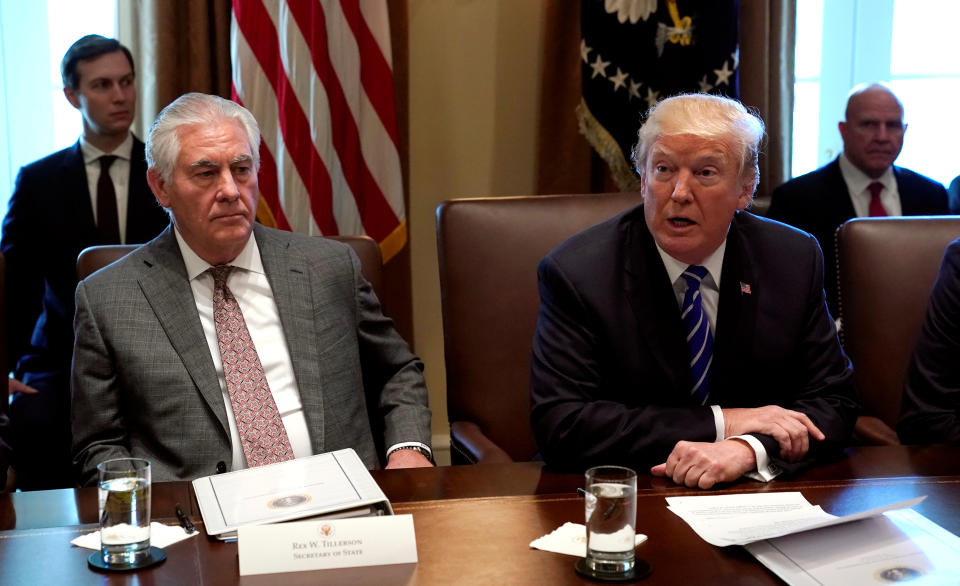Trump says he’s declaring North Korea a terrorism sponsor
WASHINGTON — President Trump announced Monday that his administration is putting North Korea back on a U.S. list of state sponsors of terrorism, a mostly symbolic blow meant to deepen the diplomatic isolation of Kim Jong Un’s regime in Pyongyang.
Speaking to reporters as he opened a meeting with his Cabinet, Trump said the designation would trigger “further sanctions and penalties” and that it “supports our maximum pressure campaign to isolate the murderous regime.” The president added that the Treasury Department on Tuesday would announce additional punitive measures, part of a campaign “over the next two weeks” to tighten the economic and diplomatic vise on North Korea.
It was unclear what new sanctions the designation would unlock: The kinds of unilateral steps that it triggers, like a ban on U.S. economic aid or U.S. arms sales, are mostly irrelevant because North Korea already does not benefit from such assistance. But Trump could enable families of terrorism victims to file civil suits in U.S. courts.
“I don’t want to suggest to you that the designation is suddenly going to put a whole new layer of sanctions on them. Because again, I think, we already have North Korea so heavily sanctioned,” Secretary of State Rex Tillerson told reporters in the White House briefing room after the announcement. “But this will close a few additional loopholes off.”
And the designation could put more pressure on countries like China, North Korea’s largest trading partner, to further sever business ties with the Stalinist regime.

Trump’s announcement came amid concerns that escalating tensions over North Korea’s nuclear and ballistic missile programs could spiral into war.
In his remarks, the president alluded to several factors behind the decision. He referred to North Korea carrying out assassinations on foreign soil. That appeared to be a reference to the Feb. 13 killing of Kim’s half-brother, Kim Jong-nam, dispatched at Kuala Lumpur International Airport in Malaysia, widely believed to be the work of North Korean agents. And he cited the death of American student Otto Warmbier, jailed during a January 2016 trip to North Korea and released in June 2017 while in a coma. He died a few days later.
“As we take this action today, our thoughts turn to Otto Warmbier, wonderful young man, and the countless others brutally affected by the North Korean oppression,” the president said.
Trump said the designation “should have happened years ago.”
And Tillerson declined to point to other assassinations other than the one at the Malaysian airport, which he called “a significant event that caused us to really begin to look carefully at what else they might have been doing. … That really got our attention.”
The United States first put North Korea on the list in 1988, in the aftermath of the November 1987 bombing of Korean Air Flight 858. North Korean agents hid explosives aboard the passenger jet, which exploded on its Baghdad-to-Seoul route, killing all of the more than 100 people aboard.

In October 2008, the Bush administration announced that it was removing North Korea from the list as part of an effort to rescue a deal to restrain and monitor Pyongyang’s nuclear programs. The Bush administration certified that the regime had not provided any support for international terrorism during the preceding six months and had promised not to support international terrorist acts in the future.
The Obama administration gave serious thought to returning North Korea to the list in late 2014, after the U.S. intelligence community fingered Pyongyang for the hacking of Sony Pictures and threats against movie theaters over the Sony-backed film “The Interview,” about a plot to assassinate Kim. The perpetrators also used malware to wipe out some of the company’s servers.
In one discussion in the White House’s Situation Room, a senior Obama aide told Yahoo News, top officials wrestled with the argument that “if this same amount of damage, amount of monetary damage, had been inflicted by a bomb exploding inside an empty Sony headquarters, and no one was killed, we’d be calling this terrorism.”
Ultimately, Obama told CNN: “I don’t think it was an act of war. I think it was an act of cyber-vandalism that was very costly, very expensive. We take it very seriously. We will respond proportionally.” Pyongyang stayed off the list, which includes Iran, Sudan and Syria.

Trump had been expected to also lean on North Korea’s abduction of Japanese nationals in the 1970s and 1980s, ostensibly to teach Pyongyang’s agents how to blend in. The secretive nation admitted to the chilling practice in 2002. Trump met with relatives of some of the kidnapping victims during his stop in Japan.
The president referenced all three actions during his September speech to the United Nations General Assembly.
“We were all witness to the regime’s deadly abuse when an innocent American college student, Otto Warmbier, was returned to America only to die a few days later. We saw it in the assassination of the dictator’s brother using banned nerve agents in an international airport,” Trump said. “We know it kidnapped a sweet 13-year-old Japanese girl from a beach in her own country to enslave her as a language tutor for North Korea’s spies.”
Trump did not announce any breakthroughs on North Korea during his recent 12-day trip to Asia. But there have been other significant developments since his return, including Singapore’s decision to suspend trade ties, in keeping with recent U.N. Security Council sanctions.
Read more from Yahoo News:


